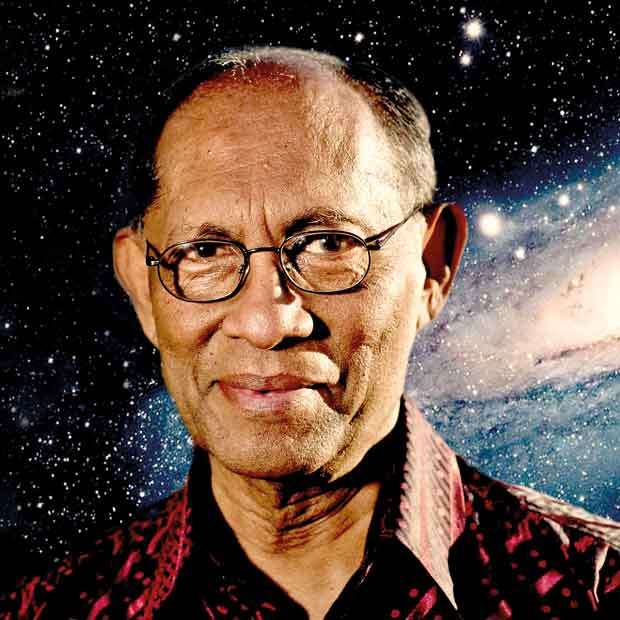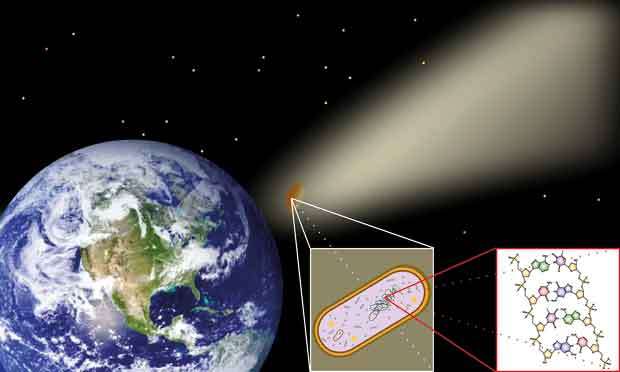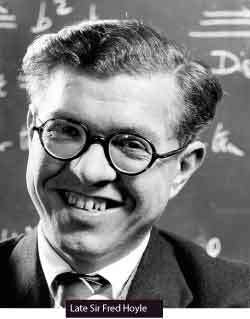03 Jan 2019 - {{hitsCtrl.values.hits}}

 For most of us, life revolves around Planet Earth. Life includes every living being that we see and we unconsciously exclude microbes and minute particles which are not visible to the naked eye. But one would be surprised to find out that life on Earth evolved from these microbes that arrived here from space, billions of years ago. Although there are several explanations to how life began including the primordial soup theory, they have been debatable. With an interest to discover how life really began, Prof. Chandra Wickramasinghe along with late Sir Fred Hoyle introduced the field of astrobiology back in the 1980s. Through this they proposed the Panspermia hypothesis - a theory suggesting that life began on Earth when the ‘seeds’ of life, already present in the Universe arrived here from space.
For most of us, life revolves around Planet Earth. Life includes every living being that we see and we unconsciously exclude microbes and minute particles which are not visible to the naked eye. But one would be surprised to find out that life on Earth evolved from these microbes that arrived here from space, billions of years ago. Although there are several explanations to how life began including the primordial soup theory, they have been debatable. With an interest to discover how life really began, Prof. Chandra Wickramasinghe along with late Sir Fred Hoyle introduced the field of astrobiology back in the 1980s. Through this they proposed the Panspermia hypothesis - a theory suggesting that life began on Earth when the ‘seeds’ of life, already present in the Universe arrived here from space.
Acknowledged as a leading expert on interstellar materials and the origin of life, Prof. Wickramasinghe is a product of Royal College and the University of Ceylon. In 1960 he obtained a First Class Honours degree in Mathematics and won a Commonwealth Scholarship to Trinity College, Cambridge. Here, he worked on his PhD degree under the supervision of Sir Fred Hoyle. He was also honoured with Cambridge University’s highest doctorate for Science, the ScD among many other titles he earned for his work in the field. He currently works as the Director of the Buckingham Centre for Astrobiology at the University of Buckingham and has played a key role in establishing the Institute of Fundamental Studies in Sri Lanka. His other research interests include infrared astronomy, light scattering theory and applications of solid state theory to astronomy among others.
In an interesting interview with the Daily Mirror, Prof. Wickramasinghe spoke about the Panspermia hypothesis, the existence of aliens and how microorganisms could reverse plastic pollution currently occurring in oceans!
Excerpts:
Q What inspired you to study astrobiology?
I became interested in astronomy from a very early age. I grew up in a suburb of Colombo in the 1940’s and 1950’s when dark and pristinely beautiful night skies were to be seen with little or no light pollution. These sights inspired me and in my early teens I penned this Haiku-style poem which already smells of astrobiology:
“Amid a myriad stars I stand alone And wonder how much life and love there was tonight…”
 Q How challenging was it to study about this discipline back then as it was new altogether?
Q How challenging was it to study about this discipline back then as it was new altogether?
The discipline of astrobiology did not exist at the time that I began my studies in Cambridge in the 1960’s. In fact the term astrobiology- implying a marriage between astronomy and biology- was first invented and used by me and my collaborator Sir Fred Hoyle in 1982. People, particularly American scientists, had ignored our unquestioned priority in this matter.
We may find microorganisms that can reverse the pollution of our oceans from the tonnes of plastic that are now threatening our various ecologies
Q People hold different views about how life began. As per the Panspermia hypothesis, how do you define it?
The traditional view of life’s origin is encapsulated in the so-called “primordial soup theory”. The origins of this theory date back to the Greek philosopher Aristotle in the 3rd century BCE. Known by the original name of “spontaneous generation” the idea that life emerges spontaneously from non-living matter became deeply embedded in Western culture. According to this view, life is essentially confined to the Earth and this idea was tenaciously held. During the Middle Ages in Europe dissenters from this point of view were often brutally punished. In 1600 the Italian scientist and poet Giodarno Bruno was burnt at the stake for saying that there were planets orbiting distant stars upon which there were other living beings.
Down the ages the absolute uniqueness and centrality of life on Earth was adamantly maintained and defended. A turning point came in 1864 when Louis Pasteur showed that microorganisms always come from pre-existing microorganisms. This was the first firm evidence that refuted spontaneous generation and supported the idea of panspermia, an idea which in fact can be traced back to the pre-Aristotle era to Aristarchus of Samos in the 5th century BC.
This dormant idea of panspermia began to receive strong support in the 1970’s with my studies on cosmic dust. In collaboration with the late Sir Fred Hoyle I proposed the theory of cometary panspermia. Evidence for this theory has now grown to a point when its denial has become virtually impossible. Studies of cosmic dust and comets show clearly that life must be a cosmic phenomenon and that life on Earth did not originate on Earth but came from the vast external cosmos.

Q If there are various bacteria and viruses that enter space, do they also have a chance of bringing in new strains of epidemics?
Yes, certainly. Bacteria and viruses arriving at our planet Earth have been responsible for directing the evolution of life from the time when life was first introduced to Earth 4200 million years ago. Occasionally an incoming virus or bacterium will cause devastating pandemics of disease. I think this has happened very many times during the course of evolution of life on Earth. Each time there would be a small surviving number that would carry through some favourable genetic variant to advance further the evolution of life. Recent studies of the human genome (DNA) have shown evidence of viral footprints from past pandemics.
I think influenza pandemics such as for instance one that happened in 1918/1919, exactly a hundred years ago, bear all the hallmarks of an epidemic driven from outside. The lethal outbreak of this pandemic started on the very same day in Boston and Bombay (Mumbai) - many thousands of miles apart. At this time there was no air travel so such a phenomenon cannot be explained as arising from person to person transmission.
Q You also claim that animals like the Octopus didn’t evolve on Earth. What evidence do you have to support this observation? Are there other similar species?
The octopus is just one example where the progression of life does not proceed in a stepwise linear progression. Evolution of life is a process that involves exchanges of genes over vast cosmological distances and spanning enormously long cosmological timescales. From a squid ancestor to reach the complex genome of the octopus is an incredible step, and must involve accommodation of genes from an alien, more evolved system. The octopus genome is almost double the size of the human genome and the intelligence of the octopus is almost legendary.
Q Do aliens exist? If yes, what is their role in the evolution of these cosmic phenomena?
Yes, of that we can be absolutely certain. Life on Earth implies life everywhere in the cosmos. And it will be hard to think that in terms of intelligence, humans (or octopus!) are anywhere near the top. I rather think that we may be at the bottom, so there would be alien life forms more advanced than we for sure.
Q Is it true that crop circles are a communication method among extra-terrestrial beings?
I don’t believe that the evidence for crop circles is convincing. I think they are all hoaxes.
Q Research is underway to unearth life on other planets including Mars. On what grounds does a planet become suitable for the existence of species?
 The number of habitable planets that exist in our Milky Way Galaxy alone is estimated at over 100 billion. This estimate is based on the several thousand exoplanetary systems that have been discovered by the orbiting Kepler telescope that has explored only small sample volume of our Milky Way. As far as our solar system goes I think that rocks (meteorites) are exchanged between planetary bodies over millions of years. So there is no doubt in my mind that the entire solar system is one connected biosphere. There must be microbial life on Mars and indeed on every planetary body where conditions to sustain life prevails.
The number of habitable planets that exist in our Milky Way Galaxy alone is estimated at over 100 billion. This estimate is based on the several thousand exoplanetary systems that have been discovered by the orbiting Kepler telescope that has explored only small sample volume of our Milky Way. As far as our solar system goes I think that rocks (meteorites) are exchanged between planetary bodies over millions of years. So there is no doubt in my mind that the entire solar system is one connected biosphere. There must be microbial life on Mars and indeed on every planetary body where conditions to sustain life prevails.
Q Can these cosmic elements such as microorganisms, microbes and other forms of life evolve to serve mankind?
Yes, on a cosmic scale microorganisms must exist that can help us in various ways. We may find microorganisms that can reverse the pollution of our oceans from the tonnes of plastic that are now threatening our various ecologies. We may find microorganisms that cure cancer, perhaps even reverse or slow down ageing!
In fact the term astrobiology- implying a marriage between astronomy and biology- was first invented and used by me and my collaborator Sir Fred Hoyle in 1982
Q When a possible meteorite shower occurred in Aralaganwila, Sri Lanka, people were not ready to believe your observations of extra-terrestrial elements being present. How challenging is it to change people’s attitudes towards respecting this field of science?
We have studied samples of this meteorite and there is no doubt that it contains fossilized life forms. People in the West are very unhappy with this because it will mark the certain death of spontaneous generation. The only way they deal with these facts is to say that this was not a meteorite, but Earth rock! Because there was no video recording of the event, but only the eyewitness account of a poor subsistence farmer Tikiri Banda in a remote part of Polonnaruwa, it is very difficult to make any headway in convincing our critics.
Q If there are Sri Lankan students interested in taking up astrobiology, what is your advice to them?
Always keep an open mind, look at the facts and respect them. People’s opinions should never take precedence over facts.
Q What are your latest findings in astrobiology?
If this theory is correct, we should be able to discover evidence of microbial life entering the Earth here and now. This evidence exists in plenty! Recently Russian cosmonauts have reported the discovery of microorganisms on the exterior window of the international space station that orbits the Earth at 400km. These could not have come from the Earth. At the present time a team of scientists at the National Institute of Fundamental Studies (NIFS) in Sri Lanka led by Professor Dhammika Maganarachchi is planning a similar collection from a height of 50km.
10 Jan 2025 1 hours ago
10 Jan 2025 2 hours ago
10 Jan 2025 3 hours ago
10 Jan 2025 3 hours ago
10 Jan 2025 3 hours ago